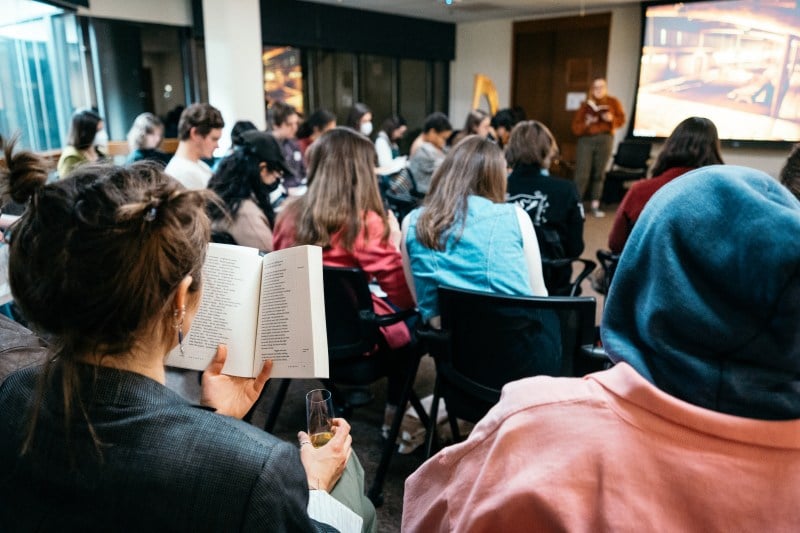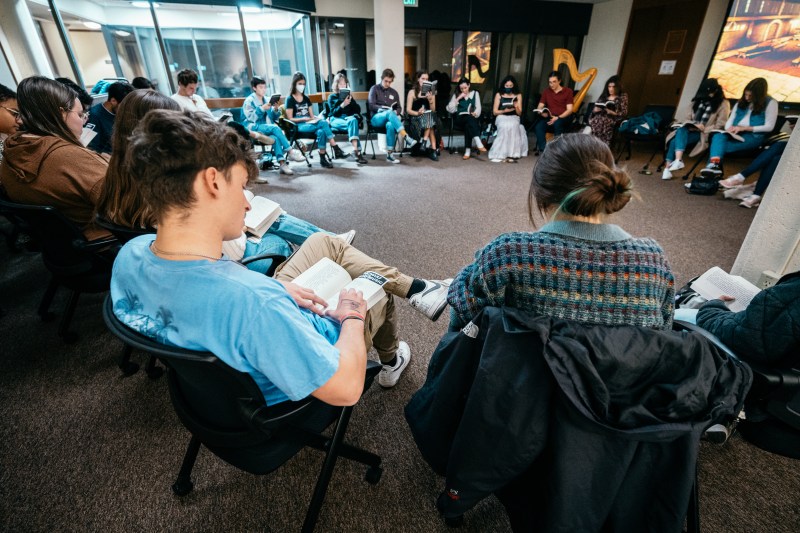On the top floor of Margaret Jacks Hall, the Stanford English Department performed a sly act of transformation on Thursday: It turned a conference room into a mead hall.
What appeared initially to be a dim classroom became the warm and protective medieval lodge of Norse legends. But it wasn’t just the room, lit by electric votives and garnered with flower arrangements, that changed; rather, the real change was in the audience. It had been led by the hand into another time and another spirit: the heart of “Beowulf.”
The English Department’s three-part “Beowulf, Mead, and Music” event held its first soiree Thursday night, and the result was immersive and transformational. Audience members from all departments enjoyed sparkling mead and a sumptuous charcuterie board as they watched a talk on the medieval mead halls of England and a dramatic Old English reading of the epic poem “Beowulf” set to live harp accompaniment. English professor Denise Gigante, Damian Drue Marlow ’23 and the cohort of English peer advisors carried out a successful night, bringing the ancient spirit of oral literature back to life on campus.
“Beowulf,” an Old English epic poem recorded in the 11th century, follows the titular hero in three battles as he defends a neighboring kingdom and himself against a series of monsters. It is written in the pre-modern poetic style of its time, with lines organized not by the rhythm of their syllables but by the alliteration of repeated sounds, like the line “Scrīðan sceadu-genga; scēotend swæfon,” (translated as “Then … came the shadow-stalker, stealthy and swift.”)
Ph.D. student Catrin Haberfield performed the story in its original medieval dialect with accuracy and verve for an eager audience, giving new life to the old language’s guttural, broad and lilting sounds. Harpist Alexis Stults accompanied her, creating an ambience of mystery and warmth for the foreign sounds to seem right at home.
The audience’s experience of the original Old English made for a richer appreciation of the translated text when the event transitioned to a group reading of the translated “Beowulf.” Each audience member took turns reading a part of the legendary poem’s beginning section as translated by Irish poet Seamus Heaney. Although the task of translating a poem with such a rich and unfamiliar sound structure is daunting, Heaney’s translation skillfully gave a taste of what Gigante called the “stony words of Anglo-Saxon,” layering his modern English with alliteration and Germanic sounds. Admittedly, the modern language of the translation initially seemed much more mundane and flimsy in the audience’s reading in comparison to the brilliant performance of the thick sounds of Old English. But as the story progressed, the audience was immersed in the world of tapestry-laden halls, gilded armor and awe-inspiring beasts in the night.

This act of immersion was set in motion by the mindful choices of the event planners, from Haberfield’s presentation of medieval imagery and artifacts, to a demonstration of a calligrapher’s ornate copy of Beowulf’s manuscript, to the late wintry night when the event was held (which Professor Gigante noted added to the feeling of a dark night’s tale in a cozy lodge). The mead — a signature ancient alcoholic drink made from fermented honey — was made by Heidrun Meadery of Point Reyes in the traditional French method. Described by one sampler as tasting like “sweet, elevated wine,” the drink also allegedly has mystical properties, which couldn’t have hurt the palpable sensation of time travel in the evening.
The audience, too, did its part to ensure the event’s success: English majors dressed in their best period garb, decked out in medieval-style dresses and tunics for the event. Others were seen in medieval-themed t-shirts, or at the very least a sense of curiosity and a game attitude for the unique event.
The joy of reading out loud and the immersion in the ancient tale fulfilled Gigante’s goal for the event exactly. “The literary tradition is so powerful. Going all the way back to ancient times, poetry is oral, so to carry that tradition forward is something that should be done in the University to provide students that experience,” she said. Gigante plans on continuing this event with other periods of English history, describing the potential of putting on a similar event for Chaucer’s “The Canterbury Tales” and then continuing through literary history. It’s exciting to imagine the potential of a possible Elizabethan evening with a play performance fit for the Globe Theatre or a Regency night with dancing and a reading of Jane Austen.
For a few hours, the “Beowulf, Mead, and Music” event transported guests into another life: one with jolly company, hushed storytelling and a respite from the world outside. “The idea was to snap us out of the moment we’re in and hear the poem on its own as a powerful experience of reading,” Gigante said.
The final two events of the “Beowulf” series will take place on Feb. 9 and Feb. 23 at 8 p.m. in the Terrace Room of Margaret Jacks Hall, with talks about medieval music by Elaine Treharne and the mystical qualities of mead by Max Ashton.
Editor’s Note: This article is a review and includes subjective thoughts, opinions and critiques.
